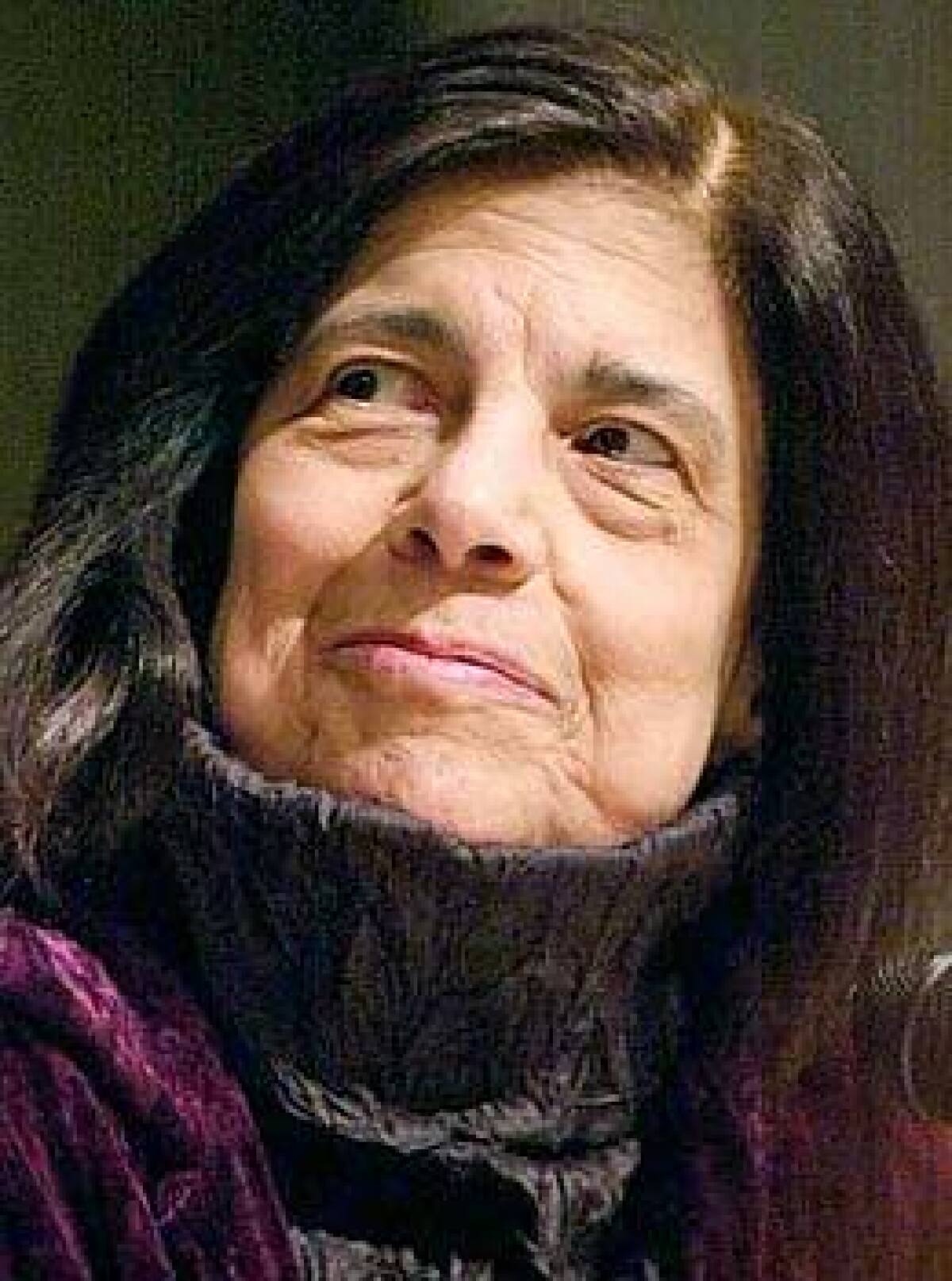Essay: The truth of fiction evokes our common humanity

Editor’s Note: The following essay is excerpted from a speech by Susan Sontag given April 7 at the Los Angeles Public Library upon receiving the library’s annual Literary Award.
Long ago—it was the 18th century—a great and eccentric defender of literature—it was Doctor Johnson—wrote, in the preface to his Dictionary: “The chief glory of every people arises from its authors.”
An unconventional proposition, I suspect, even then. And far more unconventional now, though I think it’s still true at the beginning of the 21st century. Of course, I am speaking of the glory that is permanent, not transitory.
I am sometimes asked if there is something I think writers ought to do, and recently in an interview I heard myself say: “Several things. Love words, agonize over sentences. And pay attention to the world.”
No sooner had these perky phrases fallen out of my mouth than I thought of some more recipes for writer’s virtue.
For instance: “Be serious.” By which I meant: Never be cynical. And which doesn’t preclude being funny.
And if you’ll allow me one more: “Take care to be born at a time when it was likely that you could still be exalted and influenced by Dostoevsky and Tolstoy and Chekhov.”
The truth is, whatever it might occur to you to say about what a writer ideally should be, there is always something more.
A great writer of fiction both creates a new, unique, individual world—through acts of imagination, through language that feels inevitable, through commanding forms—and responds to a world, the world the writer shares with other people but that is unknown or mis-known by still more people, confined in their worlds. Call that history, society, what you will. The writers who matter most to us are those who enlarge our consciences and our sympathies and our knowledge.
Of course, the primary task of a writer is to write well. (And to go on writing well. Neither to burn out nor to sell out.) In the end—that is to say, from the point of view of literature—a serious writer is not representative of anybody or anything but herself or himself. That, and the noble cause of literature.
Literature, I would argue, is knowledge—albeit, even at its greatest, imperfect knowledge. Like all knowledge. Still even now, literature remains one of our principal modes of understanding. A major novelist is one who understands a great deal about complexity: the complexity of society and the complexity of the private life—of family bonds, family affections, the powers of Eros, the many levels on which we feel and struggle.
Almost everything in our debauched culture invites us to simplify reality, to despise wisdom. There is a great deal of wisdom in the precious inheritance of literature which can continue to nourish us, which makes an indispensable contribution to our humanity by articulating a complex view of the human heart and the contradictions inherent in living in literature and in history.
Literature is a form of responsibility—to literature itself and to society. By literature, I mean literature in the normative sense, the sense in which literature incarnates and defends high standards. By society, I mean society in the normative sense too, which suggests that a great writer of fiction, by writing truthfully about the society in which she or he lives, cannot help but evoke (if only by their absence) the better standards of justice and of truthfulness which we have the right (some would say the duty) to militate for in the necessarily imperfect societies in which we live.
Obviously, I think of the writer of novels and stories and plays as a moral agent. In my view, a fiction writer whose adherence is to literature is, necessarily, someone who thinks about moral problems: about what is just and unjust, what is better or worse, what is repulsive and admirable, what is lamentable and what inspires joy and approbation. This doesn’t entail moralizing in any direct or crude sense.
Serious fiction writers think about moral problems practically. They tell stories. They narrate. They evoke our common humanity in narratives with which we can identify, even though the lives may be remote from our own. They stimulate our imagination. The stories they tell enlarge and complicate—and, therefore, improve—our sympathies. They educate our capacity for moral judgment.
When I say the fiction writer narrates, I mean that the story has a shape: a beginning, a middle (properly called a development) and an end or resolution. Every writer of fiction wants to tell many stories, but we know that we can’t tell all the stories—certainly not simultaneously. We know we must pick one story, well, one central story: We have to be selective. The art of the writer is to find as much as one can in that story, in that sequence, in that time (the timeline of the story, in that space, the concrete geography of the story).
“There are so many stories to tell,” muses the alter ego voice in the monologue that opens my novel, “In America.” “There are so many stories to tell, it’s hard to say why it’s one rather than another, it must be because with this story you feel you can tell many stories, that there will be a necessity in it.... It has to be something like falling in love. Who ever explains why you chose this story hasn’t explained much. A story, I mean a long story, a novel, is like an around-the-world-in-eighty days: you can barely recall the beginning when it comes to an end....”
To tell a story is to say: This is the important story. It is to reduce the spread and simultaneity of everything to something linear, a path.
To be a moral human being is to pay, be obliged to pay, certain kinds of attention.
When we make moral judgments, we are not just saying that this is better than that. Even more fundamentally, we are saying that this is more important than that. It is to order the overwhelming spread and simultaneity of everything, at the price of ignoring or turning our backs on most of what is happening in the world.
The nature of moral judgments depends on our capacity for paying attention—a capacity that, inevitably, has its limits, but whose limits can be stretched.
But perhaps the beginning of wisdom, and humility, is to bow one’s head before the thought, the devastating thought, of the simultaneity of everything and the incapacity of our moral understanding—which is also the understanding of the novelist—to take this in.
Perhaps this is an awareness that comes more easily to lyric poets, who don’t fully believe in storytelling. The incomparable early 20th century Portuguese poet and prose writer, Fernando Pessoa, wrote in his prose summum, “The Book of Disquiet”:
“I’ve discovered that I’m always attentive to, and always thinking about two things at the same time. I suppose everyone is a bit like that.... In my case the two realities that hold my attention are equally vivid. This is what constitutes my originality. This, perhaps, is what constitutes my tragedy, and what makes it comic.”
Yes, everyone is a bit like that, but the awareness of the doubleness of thinking is an uncomfortable position, very uncomfortable if held for long. It seems normal for people to reduce the complexity of what they are feeling and thinking and to close down the awareness of what lies outside their immediate experience.
Is this refusal of an extended awareness, which takes in more than is happening right now, right here, not at the heart of our ever-confused awareness of human evil and of the immense capacity of human beings to commit evil? Because there are, incontestably, zones of experience that are not distressing, which give joy, it remains a puzzle that there is so much misery and wickedness. A great deal of narrative, and the speculation that tries to free itself from narrative and become purely abstract, inquires: Why does evil exist? Why do people betray and kill one another? Why do the innocent suffer?
But perhaps the problem ought to be rephrased: Why is evil not everywhere? More precisely, why is it somewhere but not everywhere? And what are we to do when it doesn’t befall us? When the pain that is endured is the pain of others?
Hearing the news of the earthquake that leveled Lisbon on Nov. 1, 1755, and (if historians are to be believed) took with it a whole society’s optimism (but, obviously, I don’t believe that societies have only one basic attitude), the great Voltaire was struck by our inveterate inability to take in what happened elsewhere. “Lisbon lies in ruins,” Voltaire wrote, “and here in Paris we dance.”
One might suppose that today, in the age of genocide, people would not find it either paradoxical or surprising that one can be so indifferent to what is happening simultaneously elsewhere. Is it not part of the fundamental structure of experience that “now” refers to both “here” and “there”? And yet, I venture to assert, we are just as capable of being surprised by, and frustrated by the inadequacy of our response to, the simultaneity of wildly contrasting human fates as was Voltaire two and a half centuries ago. Perhaps it is our perennial fate to be surprised by the simultaneity of events, by the sheer extension of the world in time and space. That we are here, prosperous, safe, unlikely to go to bed hungry or be blown to pieces this evening, while elsewhere in the world, right now in Grozny, in Najaf, in the Sudan, in the Congo, in Gaza, in the favelas of Rio....
To be a traveler—and novelists are often travelers—is to be constantly reminded of the simultaneity of what is going on in the world, your world and the very different world you have visited and from which you have returned home.
It is a beginning of a response to this painful awareness to say: it’s a question of sympathy, of the limits of the imagination. You can also say that it’s not “natural” to keep remembering that the world is so extended. That while this is happening, that is also happening.
True.
But that, I would respond, is why we need fiction: to stretch our world.
More to Read
Start your day right
Sign up for Essential California for the L.A. Times biggest news, features and recommendations in your inbox six days a week.
You may occasionally receive promotional content from the Los Angeles Times.






